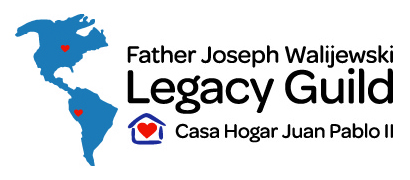Father Joe’s Years in the Jungle
As we approach the one-year anniversary of the opening of the Cause for Beatification and Canonization of the Servant of God, Father Joseph Walijewski, we are pleased to update all Guild members on the work that has been started in South America. Part of that work involves interviewing those who best knew Fr. Joe throughout the many stages of his life.
Fr. Joe lived a very interesting life and carried out his missionary work in many different countries. Most people have heard of the Holy Cross Parish in Santa Cruz, Bolivia, a few know of Villa el Salvador in Peru, and there are many who know about Casa Hogar in Lurín, but very few people have ever heard about his work in the jungle. We decided to begin our interviews in these far-reaching communities, which led us on a twelve-hour journey to Oxapampa, Peru on the border of the Amazon rainforest.
Fr. Joe’s bio reads that he spent his retirement and the last few years of his life in Oxapampa when in reality his time there was far from a traditional retirement.
Fr. Joe’s first connection with Oxapampa was back in 1988, just two years after Casa Hogar was founded. What is most interesting about his work in this area is that it seems as if everything he did in his life is recapitulated during these years from 1988-2006.
The history of Fr. Joe in Oxapampa reads like an action novel packed with excitement of far-off places, threats of danger, and learning how to adapt to all kinds of impossible challenges.
As director of Casa Hogar he was simultaneously building an orphanage for youth in Chontabamba, near Oxapampa. He began construction of the orphanage in 1988 and it was opened in 1991. At this time he also purchased a farm to be able to provide the youth with the opportunity to learn farming skills.
In 1992 a group of terrorists entered the city of Chontabamba, in search of Fr. Joe with plans to assassinate him. As God’s providence would have it, the very day that they came looking to kill him, Fr. Joe was visiting Casa Hogar in Lurín. Had he been home when they arrived this story would have a very different ending. Due to the unstable state of the area under threats from the Shining Path, he decided to close the orphanage for two years.
Although he ‘retired’ in 2000 from Casa Hogar, Fr. Joe never slowed down his pace and his mission heart continued to carry him forward. His ministry included working at the chapel in Chontabamba as well as celebrating Masses in over ten different communities throughout the jungle. He opened soup kitchens in town and even started a pre-seminary for youth interested in the priesthood. One can only marvel at the missionary zeal that inspired and led him to reach out to so many of the poorest people.
In 2003 the orphanage in Chontabamba closed, but Fr. Joe still had one more dream to fulfill; to found a nursing home. Through a number of providential encounters he was put in contact with the Josephine Sisters of Charity. They agreed to convert the orphanage into a nursing home with a capacity for 18 people. The home is still in operation and currently is home for 11 elderly under the care of three sisters.
What impressed us the most while visiting these remote sites was once people learned about the canonization process, many came up to share their appreciation for all that Padre José did for them personally, for their families and for their community. We can truly be proud of all of his works but we can be especially inspired by this last chapter of his life which is a summary of his entire missionary life.
By Jess Mollison, Director of Development for Casa Hogar Juan Pablo II
